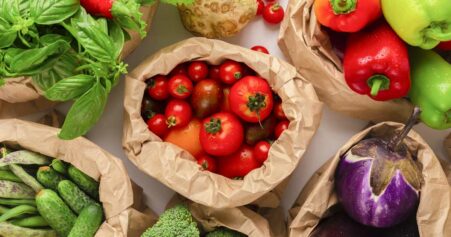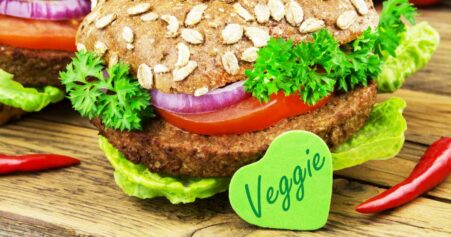Table of Contents
“Animals are my friends, and I don’t eat my friends.” This view was expressed by George Bernard Shaw some 100 years before the term vegan was coined. Today, people choose a plant-based diet for a variety of reasons. Ethical motives, such as the deep conviction that animals have the same right to life as we do, are one of the main arguments for vegans to give up meat, milk, eggs and the like. The goal of vegan activism is not to restrict the freedom of choice of others, as is often feared.
“They are bred for it.” and “Everyone should be able to decide for themselves what they eat.” is what the steak and barbecue lovers say. For people who are vegan for ethical reasons, these “arguments” are often like a knife in the heart. The reaction to the allegedly bad meat eaters is often highly emotional. Add to this a lack of well-founded information about the benefits of a plant-based diet, and the vegan seems lost.
Tough Fronts – Tough Words
Militant nuts call the one, animal murderers call the other.
Unfortunately, vegan activism often leads nowhere and tends to harden the battle lines. This is exactly the opposite of what you want to achieve with fiery speeches about ethics and animal rights. The other side also arms itself, and suddenly it is all about proving the opponent wrong as much as possible. In the end, this “eye for an eye” makes both sides blind.
It is more than understandable that no one wants to be seen as a bad person because of their preference for sausage sandwiches. But why do “ethical vegans” in particular often find it difficult to keep their cool in discussions?
Facts Not Everyone Wants To Know
Ethically motivated vegans are usually one thing: well informed.
They know, for example, that most of the animals that end up on the plates of meat-eaters in the form of sausages and the like have reached their “slaughter weight”, but usually have not even been allowed to grow up. They are still children when they die. Vegans also have far more information about how these animals lose their lives than the average omnivorous eater. Missed shots in cattle, pigs that enter scalding vats fully conscious, sometimes even deliberate torture in slaughterhouses – the list of abuses in slaughter is long, as are the violations of the conditions of confinement and transport.
But even if breeding, transportation and killing were “correct”, ethically motivated vegans see the problem in a completely different place: In 2017, 12.3 million cattle, 27.6 million pigs and 1.6 million sheep were slaughtered in Germany alone. That’s not counting horses, foals, rabbits, goats, chickens, turkeys, and other species (Federal Statistical Office, 2017).
“You can’t think about that,” is the response of many omnivores when asked how the roast can still taste good in light of these facts. Ethically motivated vegans, on the other hand, know only too well how it is to look, to think, and sometimes to despair.
Make the Connection
Make the Connection – is key when it comes to understanding ethically motivated vegans better. Because the connection between the “tasty steak” and the living creature that was killed for that meal is always there for them:
“I am expected to smile and ask, “How do you like it?” when someone bites into a meatball. But in my mind’s eye I see the agony, the pain, the blood of the animal being eaten.”
“When I see meat, I look at the animal in question and think: How can you look away? How can you support this? I feel powerless because I can’t help all the animals.”
“When people close to me eat meat and I have to watch, it’s hard for me to bear. After all, they know the suffering they cause.”
“Some days I just want to scream when I see the ads for McDonald’s and the whole animal suffering industry. You see it on every corner and you wonder why no one else cares. You can’t let it get too close to you or you’ll fall apart.”
Omnivores: Unemotional and Ruthless?
 But also the opposite group, the omnivores, who do not want to be deprived of their meat, even if it is the meat of another creature, may be in an emotional fix. Nutritional psychology tells us that eating habits are very difficult to change. Anyone who has ever tried to change undesirable eating habits, for example in order to lose a few pounds, knows that this is easier said than done. Eating habits are also deeply intertwined with cultural and family structures. Suddenly, the way your parents, grandparents, and everyone around you eat is not only wrong, but ethically reprehensible?
But also the opposite group, the omnivores, who do not want to be deprived of their meat, even if it is the meat of another creature, may be in an emotional fix. Nutritional psychology tells us that eating habits are very difficult to change. Anyone who has ever tried to change undesirable eating habits, for example in order to lose a few pounds, knows that this is easier said than done. Eating habits are also deeply intertwined with cultural and family structures. Suddenly, the way your parents, grandparents, and everyone around you eat is not only wrong, but ethically reprehensible?
Another aspect is that most people who follow a mixed diet are not as indifferent to animal suffering as some vegans might think. Fur farms, for example, or horrific animal testing and cruelty to animals are usually deeply repugnant to burger lovers as well.
If you want to better understand this dissonance between eating animals and condemning animal cruelty, you will find interesting information in Dr. Melanie Joy‘s work, who coined the term “carnism” and has studied these human behaviors extensively.
Ambassador of the Vegan Idea – With Facts and Convincing Arguments![Argumente für Veganer]()
The appeal to the heart and conscience of the omnivores does not go unheeded because barbecue and burger fans are emotionally brutalized contemporaries. This certainly applies only to a minority. The problem is that people who feel attacked automatically become defensive: Pressure always creates counterpressure. It also takes a certain amount of courage to realize how terrible the consequences of daily pleasure are for the creatures that end up on the plates and grills.
So how can the ethically motivated vegans arm themselves if they want to discuss less emotionally and thus be taken more seriously? One way is to score points with well-founded specialized knowledge about vegan nutrition. Those who know that they have scientifically sound facts can remain calm in heated debates and present their arguments in such a way that they are listened to. It also signals to your opponent that you do not hold anything against them personally. Habits, social environment and, of course, the ubiquitous advertising of the meat industry obscure the view of the facts, which in many respects speak in favor of a plant-based diet. In addition to the purely ethical aspects, there are also ecological and – last but not least – health reasons, and especially the latter should be of interest to everyone.
Vegan Nutrition Counseling – Convincing With Facts Instead of Emotions
The course “Vegan Nutritionist” (VEA) was originally conceived by experienced vegan experts for vegans to train the urgently needed specialists in this field. However, it quickly turned out: Not only people who want to work as counselors graduate from the “VEA”, but also more and more vegan families who want to use this training for themselves and their private environment. People who see themselves as ambassadors of the vegan idea also profit from this training in two ways: well-founded expert knowledge makes you more self-confident in discussions and conversations and can contribute decisively to the fact that you and the vegan idea are really taken seriously. Facts instead of fairy tales and myths naturally bring your own diet to a whole new level. The result: Nutritional knowledge does not only save your nerves in discussions, but also promotes your health on all other levels. What could be a better argument for a plant-based diet than a relaxed and all-around healthy vegan?
So anyone who cares about proactive vegan activism will find exactly what they are looking for and need with the VEA. Of course with a free trial period and our ecodemy Nutrient Database.
It is especially pleasing that the vegan idea is not only interesting for very young people, which is often claimed. The age of the VEA students is currently between 16 and 85 years, the average age is 36 years, about a third of the students are between 40 and 60 years old, and even the 60plus are very successful.








Leave a Reply